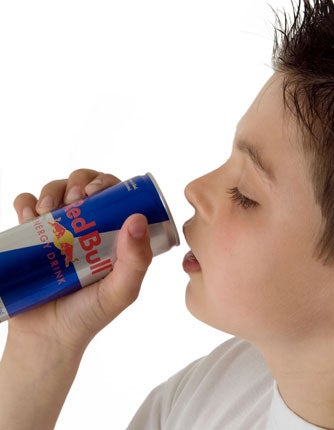Energy drinks make children fat, not fit, says study

Your support helps us to tell the story
From reproductive rights to climate change to Big Tech, The Independent is on the ground when the story is developing. Whether it's investigating the financials of Elon Musk's pro-Trump PAC or producing our latest documentary, 'The A Word', which shines a light on the American women fighting for reproductive rights, we know how important it is to parse out the facts from the messaging.
At such a critical moment in US history, we need reporters on the ground. Your donation allows us to keep sending journalists to speak to both sides of the story.
The Independent is trusted by Americans across the entire political spectrum. And unlike many other quality news outlets, we choose not to lock Americans out of our reporting and analysis with paywalls. We believe quality journalism should be available to everyone, paid for by those who can afford it.
Your support makes all the difference.Parents are are making their children fat and ruining their teeth by buying them sports or energy drinks and should give them water instead, doctors have warned.
The drinks contain extra calories that may be contributing to growing obesity because so few children do enough exercise to burn them off, a study found.
Both types of drink were condemned for their potential threats to child health, but energy drinks were singled out as products that "should never" be given to children. Marketing strategies that target young people were also criticised by the researchers.
Energy drinks contain stimulants, especially caffeine. Doctors found that caffeine in energy drinks could be in quantities up to 14 times greater than in other soft drinks, taking them to a level considered toxic, according to the study. Caffeine has been linked to seizures, diabetes, heart problems, behavioural disorders and early death.
Sports drinks contain carbohydrates, minerals, electrolytes and flavouring, and are intended primarily to replace water and electrolytes lost through sweating. Except for the most serious adolescent athletes, the report warned, energy drinks are unnecessary and potentially harmful.
Both types of drink can usually be replaced adequately by a drink of water, the researchers said. "For most children engaging in routine physical activity, plain water is best," said Dr Holly Benjamin, a lead author of the report and a doctor at the Comer Children's Hospital, part of the University of Chicago in the US.
"Sports drinks contain extra calories that children don't need, and could contribute to obesity and tooth decay. It's better for children to drink water during and after exercise, and to have the recommended intake of juice and low-fat milk with meals. Sports drinks are not recommended as beverages to have with meals."
Among the energy brands highlighted in the report were Red Bull, Monster and Rockstar. Sports drinks cited included All Sport, Gatorade and Powerade.
Dr Marcie Beth Schneider, joint lead author and a member of the American Academy of Paediatrics' Committee on Nutrition, said there was widespread confusion among consumers as to the differences between sports and energy drinks. She called for manufacturers to do more to make the differences clear.
"There is a lot of confusion about sports drinks and energy drinks, and adolescents are often unaware of the differences in these products," she said.
"Some kids are drinking energy drinks – containing large amounts of caffeine – when their goal is simply to rehydrate after exercise. This means they are ingesting large amounts of caffeine and other stimulants, which can be dangerous.
"In many cases, it can be hard to tell how much caffeine is in a product by looking at the label. Some cans or bottles of energy drinks can have more than 500mg of caffeine, which is the equivalent of 14 cans of soda."
The report was also critical of advertising campaigns which have aimed the drinks at children and have suggested that consumers can reach peaks of athletic performance by drinking them in large quantities. "Sports and energy drinks are being marketed to children and adolescents for a wide variety of inappropriate uses," the researchers said in the report published in the journal Pediatrics.
"The caloric content of sports drinks is 10 to 70 calories per serving, and the caloric content of energy drinks ranges from 10 to 270 calories per serving. In general, there is little need for carbohydrate-containing beverages other than the recommended daily intake of fruit juice and low-fat milk," they continued. "Routine ingestion of carbohydrate-containing sports drinks by children and adolescents should be avoided or restricted. Intake can lead to excessive caloric consumption and an increased risk of overweight and obesity as well as dental erosion."
The researchers were also concerned at the impact that sports and energy drinks have on teeth. Many of them have low ph levels which is closely associated with tooth decay.
Join our commenting forum
Join thought-provoking conversations, follow other Independent readers and see their replies
Comments